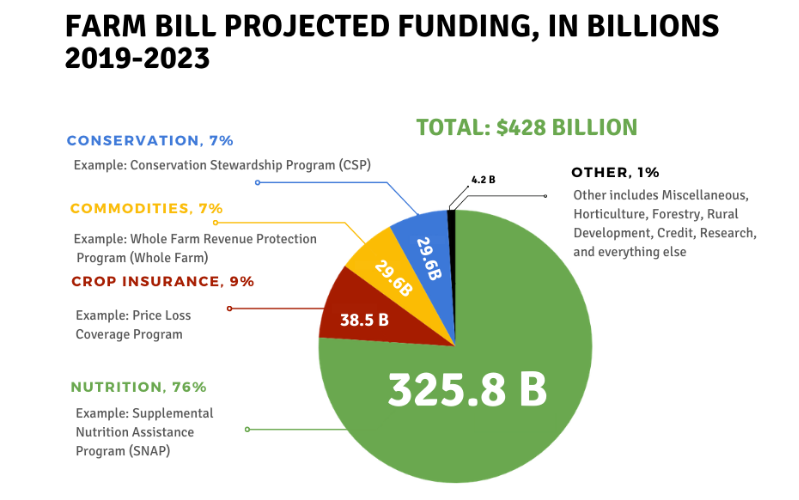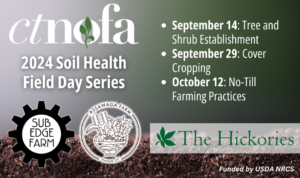2023 Farm Bill: What it means for NOFA and you

The 2023 Farm Bill will be the primary agriculture and food policy legislation of the federal government for the next 5 years. This bill determines policy and funding for agriculture, food assistance programs, natural resource allocation, new farmer resources, farmland preservation, and many other parts of our food and agricultural system in the U.S. The Farm Bill is developed and written by the Senate and House Agriculture Committees, on which Representative Jahana Hayes sits, and is voted on by both chambers of Congress. Each member of Congress has the opportunity to influence the direction of the Farm Bill by supporting key issues through marker bills. The Agricultural Committee started its process with a field hearing at Michigan State University in East Lansing, Mich., in April. You can watch that hearing by clicking here.
The Farm Bill is renewed every 5 years, and the 2023 Farm Bill will be the most important legislation affecting our farms in Connecticut until at least 2028. Below is a graph of how funds from the previous farm bill were spent. A detailed look at what we might expect from the 2023 bill can be found here, thanks to RAFI USA.

Source: USDA Economic Research Service Based on Congressional Budget Office, Direct Spending Effects for the Agriculture Improvement Act of 2018 (2018 Farm Bill), December 11, 2018
CT NOFA remains dedicated to the growth of local and organic agriculture in our state. CT NOFA, along with the other NOFA state chapter in MA, NH, VT, NY, RI, and NJ have put together some policy priorities that we will bring to congress (see below). To that end, we want to hear from our community within NOFA.
- What are some things you’d like to see in the upcoming farm bill?
- What types of projects could you use funding for on your farm?
- What are some challenges that you face that the farm bill could help alleviate?
- What priorities can help your community?
We want to work to make your voices heard in congress. If you have any questions or comments regarding the 2023 Farm Bill, please email ctnofa@ctnofa.org. We want to hear your opinions!
NOFA 2023 Farm Bill Principles. We want a farm bill that…
1. Actively invests in and protects the integrity of organic and agroecological practices as a core solution to our climate and biological crises.
Policy Priorities:
- Increase funding for organic certification cost share and streamline process for producers.
- Invest in transition support, mentorship, and technical assistance for organic and transitioning producers.
- Increase funding for organic research to allow organic production to keep pace with demand.
2. Ensures fair treatment and just livelihoods for farmers and workers throughout the food and farming system.
Policy Priorities:
- Ensure equitable price supports (i.e. parity pricing) for farm products, along with supply management to prevent oversupply and stabilize markets.
- Amend the National Labor Relations Act and the Fair Labor Standards Act to include farmworkers in the protections and wage guarantees provided to workers in other sectors.
3. Invests in rural communities, increases fairness and resilience of local and regional supply chains and breaks up consolidation in agriculture.
Policy Priorities:
- Reform Risk Management programs to increase equity and support organic and diversified operations.
- Limit corporate control and boost community control of food systems.
- Expand local processing capacity.
- Increase access to institutional markets for local, organic producers.
4. Centers racial justice across all programs and repairs past and ongoing racialized harm.
Policy priorities:
- Simplify and fast track the application process for land access and conservation programs for Black, Indigenous, and historically marginalized applicants (aka BIPOC farmers, new and beginning farmers, women farmers, LGBTQ farmers).
- Increase share of grant and technical assistance funding for historically underserved applicants.
- More targeted, culturally appropriate outreach, education and technical assistance for Black, Indigenous and other historically marginalized farmers transitioning to more sustainable practices, especially for first time and beginning farmers.
5. Promotes food sovereignty for disadvantaged communities and ensures nutrition security for all.
Policy Priorities:
- Promote equitable accessibility to agricultural land stewardship through conservation programs
- Strengthen community economic and food system resilience to respond to climate shocks through deeper investments in Urban Agriculture
- Address land access challenges, especially for BIPOC communities
- Strengthen farmer-customer community control of the food system
- Support Worker-Owned Cooperative Growth in the Agricultural Sector
- Ensure access to regionally adapted seed, promote seed sovereignty
- Protect state and local rights to regulate pesticides
- Increase access to nutrient dense, organic food, promote nutrition security through increased support for SNAP/GusNIP
- Enable food donation by passing language consistent with the Food Donation Improvement Act (McGovern, 2021), extending liability protections to food donors
- Support the Farmland Preservation recommendations of American Farmland Trust
6. Eliminates the use of toxic substances on farmland and in our food system while supporting a just transition for farmers.
Policy Priorities:
- Saving America’s Pollinator Act – a federal version of the Birds and Bees Act to ban neonicotinoids that NOFA chapters have pushed for on the state level.
- Fully implement and enforce the Agricultural Worker Protection Standards – This updated version requires that farms train workers annually in pesticide safety.
- Adopt the precautionary principle in all environmental regulations: “When an activity raises threats of harm to human health or the environment, precautionary measures should be taken even if some cause and effect relationships are not fully established scientifically. In this context the proponent of an activity, rather than the public, should bear the burden of proof.”
Marker Bills NOFA Supports
Agriculture Resilience Act
Establishes goal for agriculture to reach net zero by 2040, while investing in agricultural research, soil health, transition to pasture-based livestock, ensuring farmland preservation and viability, on-farm renewable energy, and reducing food waste. Strengthening Local Processing Act Comprehensive plan to increase slaughter options for local livestock and poultry producers, assist smaller facilities as they adapt to the COVID-19 pandemic, and help consumers access locally-raised meat and poultry.
Farm to School Act
Expands funding for and scope of USDA Farm to School Grant Program, while prioritizing grant proposals that engage beginning, veteran and socially disadvantaged farmers and serve high-need schools
Justice for Black Farmers Act
Enacts policies to end discrimination within the USDA, protect remaining Black farmers from losing their land, provide land grants to create a new generation of Black farmers and restore the land base that has been lost, and implement systemic reforms to help family farmers across the United States.
Milk from Family Dairies Act
The plan would pay dairy farmers a fair wage based on their costs of production – for huge taxpayer savings. It would incentivize family-scale dairy farms over megadairies and ensure a consistent supply of regional milk for processors and consumers.
Food from Family Farms Act
Sets price floors at fair levels above the cost of production; implement supply management to prevent oversupply; establishes grain reserves to protect eaters, industry, and livestock interests from price spikes during times of shortage; and enacts strong conservation measures that incentivize farmer participation.
If you have any questions or comments regarding the 2023 Farm Bill, please email ctnofa@ctnofa.org. We want to hear your opinions!
Recent Posts
CT NOFA Announces 2024 Slate of Soil Health Field Days
Beginning in late summer, CT NOFA will host three field days centered on soil health…
Read MoreCT NOFA Board Member, Freedom Gerardo, Featured on New Hampshire Public Radio
CT NOFA board member, Hector “Freedom” Gerardo, was recently featured on New Hampshire Public Radio’s…
Read More

